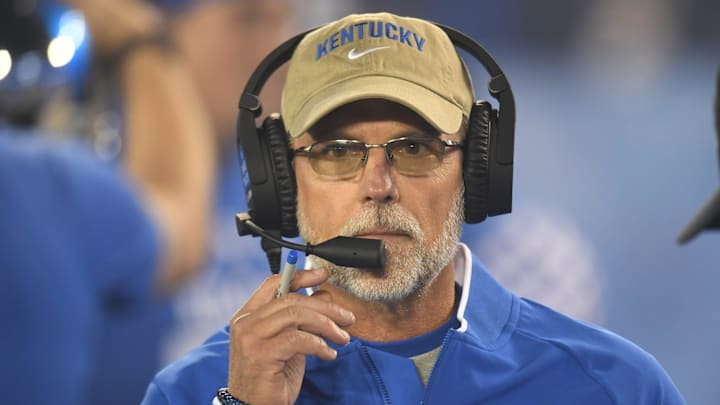How Eddie Gran's return ended the Stoops-Marrow era at Kentucky
For a decade, Vince Marrow was more than just a coach at Kentucky — he was the connective tissue that held the entire program together. He wasn’t drawing up plays or overhauling schemes; his genius was in everything you couldn’t diagram on a whiteboard.
When players needed guidance, they didn’t go to Mark Stoops. They went to Marrow. When families visited on recruiting weekends, it was Marrow who sealed the deal. When friction surfaced behind closed doors, it was Marrow who smoothed it out. He was the sounding board, the fixer, the Big Dawg.
But like many long-standing partnerships in college football, quiet power shifts happen. And Marrow’s fall from influence didn’t come in some dramatic blow-up. It started with a subtle move back in 2021, when Mark Stoops brought Eddie Gran back into the building.
To understand how we got here, you have to rewind according to On3.
Five years ago, Kentucky’s offense had grown stale under Gran’s leadership as offensive coordinator. The passing game sputtered, fans grew restless, and eventually Stoops made the hard call to part ways. Liam Coen was hired and immediately injected life into the offense, modernizing the attack and bringing Kentucky its best quarterback play in years. It was a new era. But behind the scenes, Stoops never fully cut ties with Gran.
In 2021, Gran returned as a special assistant to the head coach—a vague title, but one that carried real weight. And that was the pivot point.
For years, Stoops leaned on Marrow like no one else. His counsel carried immense influence in nearly every major decision — recruiting, roster management, culture. But with Gran back in the fold, Stoops had a new voice in his inner circle. Slowly, but unmistakably, Marrow’s voice got softer.
What used to be Marrow’s calls started turning into joint decisions. Then they became Stoops' calls alone. Gran became the coach Stoops leaned on for tough roster evaluations and behind-the-scenes program management. Marrow, for the first time in years, found himself standing on the outside of Kentucky's core decision-making process.

It wasn’t immediate. It was erosion.
Each year, Marrow’s sphere shrank. His recruits became someone else’s evaluations. His preferences weren’t always the program’s priorities. For a man who built his reputation on relationships and loyalty, watching his influence diminish likely cut deeper than any salary adjustment.
And with that shift came the job rumors. Every offseason, Marrow's name was linked to openings across the country. He flirted with Michigan State, Youngstown State, Cincinnati, and yes — even Louisville — more than once. The Big Dawg was quietly looking for a new yard.
The underlying tension finally broke this summer when Marrow officially bolted for Louisville — not as an on-field coach, but in a behind-the-scenes role that allowed him to sidestep his $200,000 annual buyout clause at Kentucky. It wasn’t just an exit; it was a surgical one. No warning, no courtesy call to Stoops — just a breaking news alert.
In the end, the man who once served as the bridge between Stoops and his players saw that bridge slowly dismantled the moment Eddie Gran walked back through the door. What started as a simple administrative hire in 2021 ultimately fractured one of the most productive partnerships in Kentucky football history.
Now, the program enters a new chapter without its Big Dawg. And while Kentucky will keep marching forward under Stoops, there’s no question: the program's heartbeat feels a little different today.
